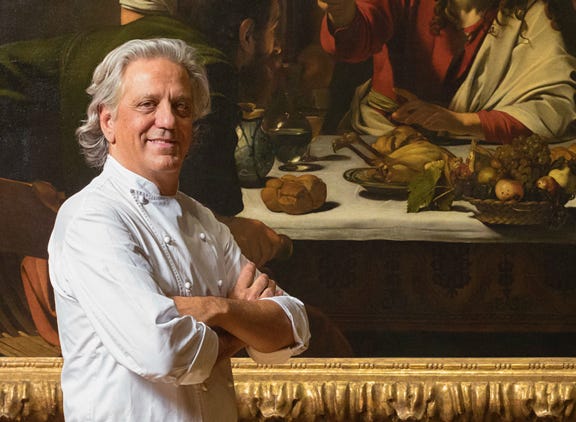Tighter visas, emptier kitchens
The UK’s immigration clampdown is starving its hospitality sector (especially Italian restaurants)
Visti più stretti, cucine più vuote
La nuova stretta UK rischia di affamare la ristorazione (anche italiana).
Il nuovo giro di vite sui visti per lavoratori qualificati rischia di far collassare il settore hospitality britannico. E mentre alcuni italiani a Londra applaudono (non si sa per quale infatuazione), i ristoratori italiani pagano il conto più salato.
Dopo la Brexit, l’ennesimo colpo alla ristorazione nel Regno Unito arriva sotto forma di una nuova stretta sull’immigrazione. Il governo laburista ha appena pubblicato un whitepaper che riscrive le regole per il Skilled Worker Visa, rendendo l’accesso al lavoro nel Regno Unito ancora più difficile per gli stranieri.
Ora serviranno stipendi minimi di £38.700, qualifiche equivalenti a una laurea e un livello avanzato d’inglese. Un muro burocratico che rischia di svuotare cucine e sale proprio mentre il settore dell’hospitality affronta una carenza di personale cronica: oltre 170.000 posti vacanti, secondo UKHospitality.
Chi pensava che la Brexit avrebbe “liberato” il mercato del lavoro locale, si trova davanti una realtà ben diversa. I tentativi del governo di sostituire la manodopera straniera con lavoratori britannici attraverso il nuovo programma SWAP (100.000 tirocini per disoccupati) sono lenti, teorici, e non risolvono un problema culturale: la ristorazione, oggi, attira poco. Paghe basse, ritmi estenuanti, profitti risicati. E nessuno si improvvisa chef o cameriere da un giorno all’altro.
Nel frattempo, i ristoratori italiani a Londra – una volta protagonisti di un'espansione brillante – vedono il sogno sgretolarsi. Prima le difficoltà d’importazione di prodotti autentici, poi la fuga del personale europeo post-Brexit, ora questo. La qualità e l’identità della cucina italiana all’estero, che si fonda anche su mani esperte e ingredienti veri, è sempre più difficile da garantire.
Non tutti però sembrano accorgersene. Anzi, c’è chi, soprattutto tra certi italiani "di successo" nella City o che si ritengono parte dell’elite londinese, continua a ripetere che Londra è “la città migliore del mondo” e che “chi vuole lavorare ce la fa comunque”. Discorso facile, se non si lavora tra fornelli, turni serali e stipendi incerti.
Anche personaggi noti come Giorgio Locatelli hanno dovuto adattarsi: ha chiuso il suo ristorante storico per aprire un nuovo locale più “istituzionale” alla National Gallery e un bar centrato sui maritozzi, dolce romano di nicchia ma ad alto margine. Ma non tutti hanno la visibilità o i capitali per reinventarsi così.
Il paradosso è che proprio quei settori che più rappresentano l’eccellenza italiana – ristorazione, artigianato, accoglienza – sono oggi tra i più penalizzati dal combinato disposto di Brexit, inflazione e politiche migratorie restrittive. E mentre Londra continua a vendersi come vetrina cosmopolita, le sue cucine rischiano di svuotarsi non solo di lavoratori, ma anche di identità.
Se il Regno Unito continuerà a irrigidire le proprie frontiere senza affrontare la crisi strutturale del lavoro nell’hospitality, il risultato sarà un’offerta gastronomica più povera, meno autentica. E non ho nemmeno iniziato ad affrontare le conseguenze per l’hotellerie…
Tighter visas, emptier kitchens
The UK’s immigration clampdown is starving its hospitality sector (especially Italian restaurants)
The UK’s latest visa restrictions could deal a final blow to a hospitality industry already shaken by Brexit and labour shortages — and Italian restaurateurs are paying the highest price.
Brexit was only the beginning. Since the UK left the European Union, Italian restaurants across the country have been struggling with a growing list of challenges: soaring import costs for authentic Italian products, a sharp decline in available EU staff, and the ongoing economic squeeze on hospitality margins. Now, a new wave of restrictions on skilled worker visas threatens to push many over the edge.
The latest immigration whitepaper, unveiled on 12 May 2025 by the Labour government, introduces stricter rules for obtaining a Skilled Worker visa. Foreign applicants must now meet a minimum salary threshold of £38,700, hold a qualification equivalent to a university degree, and meet higher English language requirements. On top of that, new barriers are being placed on international students, long a key source of part-time labour in bars, pubs, and restaurants.
These moves are officially designed to curb the UK's record net migration — which hit a staggering 906,000 in June 2023 — but the real-world impact on the hospitality industry is severe. Already short by over 170,000 workers, the sector relies heavily on international staff. In 2023 alone, 8,500 hospitality visas were issued to fill critical gaps, according to UKHospitality.
The government’s proposed solution? A domestic reskilling programme called SWAP (Sector-based Work Academy Programme), which promises to train up to 100,000 unemployed UK citizens to enter hospitality roles. But this is a slow, uncertain fix for a fast-moving crisis. Restaurant work is hard, often poorly paid, and increasingly unattractive to locals — especially young people.
Italian restaurateurs, once at the heart of London’s culinary boom, are bearing the brunt of this shift. With rising costs, shrinking staff pools, and tightening regulations, preserving the authenticity of Italian cuisine has become a daily uphill battle. It’s not just about survival — it’s about preserving cultural identity through food.
Yet some Italian voices in London remain oddly upbeat. Influencers, businesspeople, and self-styled “success stories” continue to sing the praises of post-Brexit London, insisting that “those who want to work can still make it.” That narrative, however, feels tone-deaf to those working 14-hour shifts in kitchens or struggling to find qualified staff.
Even celebrity chefs like Giorgio Locatelli have had to adapt: after closing his flagship restaurant, he opened a more strategically positioned venue at the National Gallery and a maritozzo-themed café — a move as symbolic as it is tactical. But not every Italian restaurant has the media clout or investor backing to pivot so easily.
It’s a cruel irony: the UK government is making it harder for the very workers who sustain its food, culture, and daily life to stay — while still marketing Britain as an open, cosmopolitan society. If these trends continue, what’s at risk is not just business viability, but the richness and diversity of the UK’s food landscape itself.
Without a serious rethink of immigration policy and structural support for hospitality, the UK may soon find itself with fewer restaurants, poorer cuisine, and a reputation at odds with the multicultural reality it still claims to embrace.



